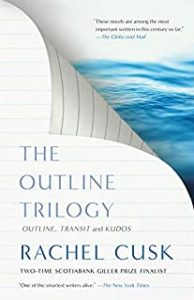Outline, Rachel Cusk 2014
Outline is the first volume of a trilogy written by this 53 year old Canadian born writer who lives and writes in England. I’ve managed to read them out of order with ‘Transit’, the second volume read in 2017 and then ‘Kudos’, the final volume read in 2018. All of them share the characteristic of having an almost invisible narrator about whom we learn precious little during the books. On the other hand, she has a knack for learning all the details about the lives of all of the various characters she comes in contact with. As in the other volumes, this process begins on the very first page where she describes her lunch with a billionaire and then abruptly transitions to a conversation with her ‘neighbor’ on the airplane taking her from London to Athens where she will be an instructor in a writing workshop. Over the course of her few days in Athens we learn about the ‘neighbor’s’ marriages, children, homes, career, and his boat in one monologue after another. As her stay in Athens goes on, we learn about two of her fellow instructors, a Greek friend, and the friends of her Greek friends. The only thing we don’t learn much about in the narrator. Even her name, Faye, is used on only one occasion and we learn of her children, her divorce and her lack of interest in any romantic liaisons almost by accident . The book moves along due to Cusk’s unique style. A character drops into the book with no background information and is describing her/his life when suddenly the narrator intervenes with a deeply thoughtful insight about life. for example, while having lunch with Paniotis, an old friend from publishing, Faye comments that “it seemed to me that life is a series of punishments for such moments, of unawareness, that one forges one’s own destiny by what one doesn’t notice or feel compassion for; that what you don’t know and don’t make the effort to understand will become the very thing you are forced into knowledge of.” This observation seems to be a fairly good summary of the theme in these three books as Faye serves as the listening post for all of these people to pour out their stories and troubles while nary a single one ever asks her about her own life. What are we to make of Cusk’s objective here? Are we all so isolated and alone (moments of unawareness) that it is hopeless to reach out, to connect, to try to understand each other? Or is she saying that we must reach out, connect, draw out the other if we are not to be terribly alone and empty. Alexandra Schwartz (another brilliant young writer) in a New Yorker profile in 2018 writes that “Cusk has chosen to submit her character to such a radical experiment in passivity, and to respond to the chatty, descriptive tradition of the naturalistic English novel with deliberately wrought formalism and silence”. Cusk is a brilliant writer, ultimately for me the bearer of a sad and lonely message.



